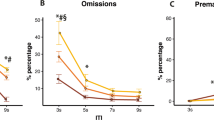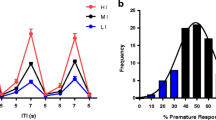Abstract
Rationale
There is extensive evidence that alcoholism and impulsivity are related, but the direction of causality is unclear.
Objectives
The aim of the present investigation was to study the effects of chronic ethanol treatment and withdrawal in measures of attention and impulse control in the five-choice serial reaction time task (5CSRTT) in mice.
Materials and methods
C57BL/6J mice were trained in the 5CSRTT and then tested in a variable inter-trial interval (vITI) session, which promotes the emergence of premature responses, a measure of poor inhibitory control. Following chronic ethanol treatment, mice were tested in additional vITI sessions—in experiment 1, at 1, 7 and 14 days post-withdrawal, and in experiment 2, at 14, 28, 42 and 56 days post-withdrawal.
Results
Control animals showed a reduction in premature responding with experience of the vITI schedule. Compared to controls, previous ethanol treatment did not affect attention or impulsivity on first experience of the vITI procedure. Ethanol-treated animals showed sustained increased premature responding over sessions. This effect of ethanol treatment was not apparent in experiment 2, in which first exposure to the vITI schedule was delayed for 2 weeks following ethanol treatment.
Conclusions
Chronic ethanol treatment impaired the ability to learn to modify behaviour in order to gain access to reinforcement more frequently. This effect was related to the time since withdrawal.





Similar content being viewed by others
References
Bari A, Dalley JW, Robbins TW (2008) The application of the 5-choice serial reaction time task for the assessment of visual attentional processes and impulse control in rats. Nat Protoc 3:759–767
Bizarro L, Patel S, Stolerman IP (2003) Comprehensive deficits in performance of an attentional task produced by co-administering alcohol and nicotine to rats. Drug Alcohol Depend 72:287–295
Borlikova GG, Elbers NA, Stephens DN (2006) Repeated withdrawal from ethanol spares contextual fear conditioning and spatial learning but impairs negative patterning and induces over-responding: evidence for effect on frontal cortical but not hippocampal function? Eur J Neurosci 24:205–216
Carli M, Robbins TW, Evenden JL, Everitt BJ (1983) Effects of lesions to ascending noradrenergic neurones on performance of a 5-choice serial reaction task in rats; implications for theories of dorsal noradrenergic bundle function based on selective attention and arousal. Behav Brain Res 9:361–380
Cherpitel CJ (1993) Alcohol and injuries: a review of international emergency room studies. Addiction 88:923–937
Cherpitel CJ (1999) Substance use, injury, and risk-taking dispositions in the general population. Alcohol Clin Exp Res 23:121–126
Christakou A, Robbins TW, Everitt BJ (2004) Prefrontal cortical–ventral striatal interactions involved in affective modulation of attentional performance: implications for corticostriatal circuit function. J Neurosci 24:773–780
Critchlow B (1986) The powers of John Barleycorn. Beliefs about the effects of alcohol on social behavior. Am Psychol 41:751–764
Dalley JW, Mar AC, Economidou D, Robbins TW (2008) Neurobehavioral mechanisms of impulsivity: fronto-striatal systems and functional neurochemistry. Pharmacol Biochem Behav 90:250–260
Deckel AW, Bauer L, Hesselbrock V (1995) Anterior brain dysfunctioning as a risk factor in alcoholic behaviors. Addiction 90:1323–1334
Dougherty DM, Marsh-Richard DM, Hatzis ES, Nouvion SO, Mathias CW (2008) A test of alcohol dose effects on multiple behavioral measures of impulsivity. Drug Alcohol Depend 96:111–120
Duka T, Townshend JM, Collier K, Stephens DN (2003) Impairment in cognitive functions after multiple detoxifications in alcoholic inpatients. Alcohol Clin Exp Res 27:1563–1572
Ericksen KP, Trocki KF (1994) Sex, alcohol and sexually transmitted diseases: a national survey. Fam Plann Perspect 26:257–263
Evenden JL (1999) Varieties of impulsivity. Psychopharmacology (Berl) 146:348–361
Everitt BJ, Cardinal RN, Parkinson JA, Robbins TW (2003) Appetitive behavior: impact of amygdala-dependent mechanisms of emotional learning. Ann NY Acad Sci 985:233–250
Giancola PR, Zeichner A, Yarnell JE, Dickson KE (1996) Relation between executive cognitive functioning and the adverse consequences of alcohol use in social drinkers. Alcohol Clin Exp Res 20:1094–1098
Givens B (1997) Effect of ethanol on sustained attention in rats. Psychopharmacology (Berl) 129:135–140
Givens B, McMahon K (1997) Effects of ethanol on nonspatial working memory and attention in rats. Behav Neurosci 111:275–282
Jentsch JD, Taylor JR (1999) Impulsivity resulting from frontostriatal dysfunction in drug abuse: implications for the control of behavior by reward-related stimuli. Psychopharmacology (Berl) 146:373–390
Kalivas PW, Volkow ND (2005) The neural basis of addiction: a pathology of motivation and choice. Am J Psychiatry 162:1403–1413
Kollins SH (2003) Delay discounting is associated with substance use in college students. Addict Behav 28:1167–1173
Loeber S, Duka T, Welzel H, Nakovics H, Heinz A, Flor H, Mann K (2009) Impairment of cognitive abilities and decision making after chronic use of alcohol: the impact of multiple detoxifications. Alcohol Alcohol 44:372–381
Moselhy HF, Georgiou G, Kahn A (2001) Frontal lobe changes in alcoholism: a review of the literature. Alcohol Alcohol 36:357–368
Noel X, Van der Linden M, d’Acremont M, Bechara A, Dan B, Hanak C, Verbanck P (2007) Alcohol cues increase cognitive impulsivity in individuals with alcoholism. Psychopharmacology (Berl) 192:291–8
Oliver YP, Ripley TL, Stephens DN (2009) Effect of ethanol on impulsivity in two strains of mice: similarities to diazepam and ketamine. Psychopharmacology 204:679–692
Rezvani AH, Levin ED (2003) Nicotine–alcohol interactions and attentional performance on an operant visual signal detection task in female rats. Pharmacol Biochem Behav 76:75–83
Robbins TW (2002) The 5-choice serial reaction time task: behavioural pharmacology and functional neurochemistry. Psychopharmacology (Berl) 163:362–380
Roberto M, Nelson TE, Ur CL, Gruol DL (2002) Long-term potentiation in the rat hippocampus is reversibly depressed by chronic intermittent ethanol exposure. J Neurophysiol 87:2385–2397
Spinella M (2004) Neurobehavioral correlates of impulsivity: evidence of prefrontal involvement. Int J Neurosci 114:95–104
Stephens DN, Duka T (2008) Cognitive and emotional consequences of binge drinking: role of amygdala and prefrontal cortex. Phil Trans R Soc Lond B: Biol Sci 363:3169–3179
Stephens DN, Brown G, Duka T, Ripley TL (2001) Impaired fear conditioning but enhanced seizure sensitivity in rats given repeated experience of withdrawal from alcohol. Eur J Neurosci 14:2023–2031
Stephens DN, Ripley TL, Borlikova G, Schubert M, Albrecht D, Hogarth L, Duka T (2005) Repeated ethanol exposure and withdrawal impairs human fear conditioning and depresses long-term potentiation in rat amygdala and hippocampus. Biol Psychiatry 58:392–400
Tarter RE, Kirisci L, Habeych M, Reynolds M, Vanyukov M (2004) Neurobehavior disinhibition in childhood predisposes boys to substance use disorder by young adulthood: direct and mediated etiologic pathways. Drug Alcohol Depend 73:121–132
Townshend JM, Duka T (2005) Binge drinking, cognitive performance and mood in a population of young social drinkers. Alcohol Clin Exp Res 29:317–325
Acknowledgements
This work was carried out with the support of UK Medical Research Council Programme Grant G0400568. YPO was funded by the IMAGEN consortium that receives research funding from the European Community’s Sixth Framework Programme (LSHM-CT-2007-037286). This paper reflects only the authors’ views and the Community is not liable for any use that may be made of the information contained therein. We thank T. Ripley for providing support with programming and data analysis.
Author information
Authors and Affiliations
Corresponding author
Rights and permissions
About this article
Cite this article
Walker, S.E., Peña-Oliver, Y. & Stephens, D.N. Learning not to be impulsive: disruption by experience of alcohol withdrawal. Psychopharmacology 217, 433–442 (2011). https://doi.org/10.1007/s00213-011-2298-0
Received:
Accepted:
Published:
Issue Date:
DOI: https://doi.org/10.1007/s00213-011-2298-0




